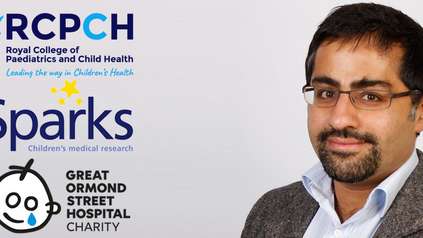Honouring research excellence: Dr Sam Behjati wins award for work to unravel the identity and origin of childhood cancers
Since 1999, Sparks charity has funded the Dr Simon Newell award along with the Royal College of Paediatrics and Child Health (RCPCH) to recognise excellence in child health research. GOSH Charity has co-supported the award since 2017. This annual honour is open to outstanding clinician researchers early in their academic career, and is named in memory of Dr Simon Newell – a renowned and widely respected neonatologist and paediatrician who had a passion for encouraging the next generation of paediatric clinicians and researchers.
This year’s recipient Dr Behjati is Group Leader in Cellular Genetics at the Wellcome Sanger Institute, one of the world’s leading genome and biodata institutes. He is also a Consultant Paediatric Oncologist at Addenbrooke’s Hospital in Cambridge, where he looks after children with cancer. He was nominated by Professor Kathy Pritchard-Jones and is described as one of the country’s most successful paediatric scientists and a key player in childhood cancer research.
Dr Behjati’s research is focused on understanding how and why childhood cancer happens. Using state-of-the-art technologies to ‘read’ the unique genetic code hidden inside cells, he hopes to identify the exact point in a child’s development when cancer cells form. In a high-profile study published last year Dr Behjati and his team used cutting-edge techniques to study the genetic code inside individual microscopic kidney cells, and compared these healthy sequences with those from children and adults with a type of kidney cancer known as Wilms’ tumour.
Wilms’ is the most common type of kidney cancer in children. It happens when something goes wrong as a child is developing in the womb and some of their immature kidney cells don’t turn into fully formed kidney cells. If this happens, those cells begin to grow out of control and can develop into a Wilms’ tumour.
Dr Behjati’s research identified the exact point in a kidney cell’s maturation process where these faulty cells develop. Critical information like this about Wilms’ tumour and other childhood cancers could offer opportunities to mature, rather than kill, cancer cells. This could potentially lead to kinder, less aggressive and potentially even more effective treatments.
“I am delighted to see Sam’s exemplary efforts in the area of childhood cancer research recognised. Research is fundamentally important to help us find new, kinder treatments, and cures, for those children with rare and complex conditions, like childhood cancers. I congratulate Sam on receiving this award and look forward to seeing the development of his exciting research in the future.”
Kiki Syrad – who is Director of Grants & Impact for both GOSH Charity and its partner charity Sparks
“Child health research lays the foundation for the future health of our nation and with over 1 800 new cases of cancer diagnosed in children per year in 2013-15 in the UK, Sam’s dedication to this area of research in particular, will benefit families and health colleagues for many now and in years to come.
“Sam is a role model for the next generation of paediatricians and I congratulate him on winning this well-deserved award.”
Professor Russell Viner, President of the Royal College of Paediatrics and Child Health (RCPCH)
“I feel very honoured to receive this recognition by my colleagues.”
Dr Sam Behjati Group leader of the Cancer genomics & single cell transcriptomics team, at the Wellcome Sanger Institute
Dr Simon Newell was connected to Sparks throughout his career, first as a researcher, then as a member of the Medical Advisory Committee, and later as a Trustee. This award has been named in his memory, as recognition of his tremendous contribution to child health research, and is worth £2000.
More information
Selected websites
About Sparks
Sparks raises money to fund pioneering children’s medical research. Since 1991, it has funded more than 285 ground-breaking research projects in over 90 hospitals, universities and research institutions across the UK and overseas. www.sparks.org.uk
The Wellcome Sanger Institute
The Sanger Institute is one of the world’s leading genome and biodata institutes. Through its ability to conduct research at scale, it is able to engage in bold and long-term exploratory projects that are designed to influence and empower science globally. Institute research findings, generated through its own research programmes and through its leading role in international consortia, are being used to develop new diagnostics and treatments for human disease and to understand life on Earth. Find out more at scion-02.sandbox.sanger.ac.uk or follow @sangerinstitute on Twitter, Facebook, LinkedIn and on our Blog.
About Great Ormond Street Hospital and Great Ormond Street Hospital Children’s Charity:
Great Ormond Street Hospital is one of the world’s leading children’s hospitals with the broadest range of dedicated, children’s healthcare specialists under one roof in the UK. The hospital’s pioneering research and treatment gives hope to children from across the UK with the rarest, most complex and often life-threatening conditions. Our patients and families are central to everything we do – from the moment they come through the door and for as long as they need us.
Great Ormond Street Hospital Children’s Charity needs to raise money to support the hospital to give seriously ill children, the best chance for life. The charity funds research into pioneering new treatments for children, provides the most up to date medical equipment, funds support services for children and their families and supports the essential rebuilding and refurbishment of the hospital. You can help us to provide world class care for our patients and families. For more information visit www.gosh.org



